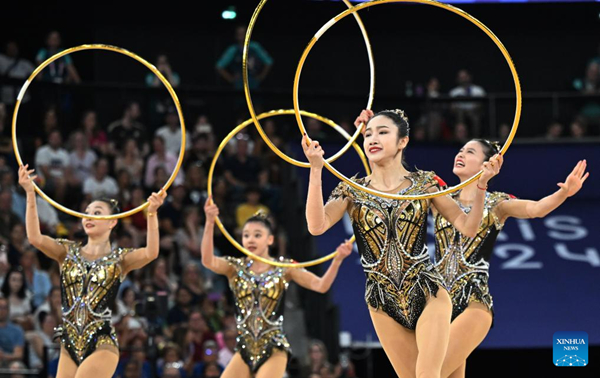
 0 Comment(s)
0 Comment(s) Print
Print E-mail China.org.cn, September 28, 2024
E-mail China.org.cn, September 28, 2024
A five-woman Chinese team posted a total of 69.800 points in the final of the rhythmic gymnastics of Paris Olympics, which was divided into two routines: one using hoops, the other with athletes using ribbons and balls, at Porte de La Chapelle Arena on Aug. 10, 2024.

Chinese team at the Games. [Photo/Xinhua]
China topped the eight-team final in hoops and ranked third in the other portion of the final to edge Israel by 0.950 points. The China team pulled off a stunner in rhythmic gymnastics, as the Associated Press commented, becoming the first non-European country to win Olympic gold in the group event by finishing just ahead of Israel and Italy.
China arrived at the Olympics as the only non-European team to medal in the group final, earning silver at Beijing in 2008.
"We have been waiting for this moment for a long time," China coach Sun Dan said. "As it's Rhythmic Gymnastics, art has no frontiers. In this discipline, we should be inspired by the richness of all cultures and we wanted to showcase the Chinese style. Here we have an association of art and sport, and I'm so happy because after so many years of effort we finally have a good result."
Notably, among the five Chinese rhythmic gymnasts, Huang Zhangjiayang, a 24-year-old from Jinniu district of Chengdu, Sichuan province, has made breakthroughs for her hometown. Her success is a testimony to the progress the district has made in cultivating sports talents these years.
For a long time, the sport departments of Jinniu district have been pioneering and innovating around the "integration of sports and education", gathering the top sports resources in Chengdu, the provincial capital, and even the whole country, and building a high-level competitive talent training system that integrates modern sport technology and professionalism.
For instance, through close cooperation with provincial and municipal sports institutions, Jinniu District Youth Sports School has not only built a number of high-standard training bases in various sports, but also successfully introduced a world-class coaching team to provide students with all-round and high-quality training guidance in some certain fields.
It is such efforts and long-term input that have enabled the sports school to achieve fruitful results in cultivating sports talents with Huang being a representative. The school has won the honor of "High-level Sports Reserve Talent Base" issued by the Provincial Sports Bureau of Sichuan for four consecutive times over the past years, and was officially recognized by the General Administration of Sport in China as the "National High-level Sports Reserve Talent Base (2021-24)" last year, which is rare for district-level sports schools in the Southwest China.
When Huang prepared for Paris Olympics in the national team, the sport authorities of Jinniu district had always acted as her solid backing, providing all supports they could.
As a high-level athlete uncovered and trained by the sports school, Huang's success at the Paris Olympics looks set to inspire more young athletes at not only her alma mater but also her hometown to realize their sports dreams on a higher stage.
In the future, the sport departments of Jinniu will continue to work with partners such as Chengdu Sports School for Children to further enhance its training system, enlarge its talent pools and improve the overall management efficiency, so as to help more young people chase their dreams in bigger sport arenas.